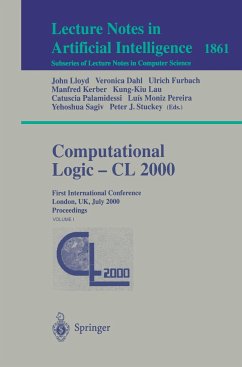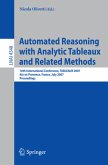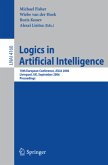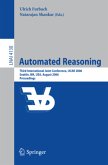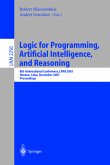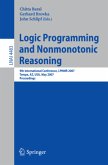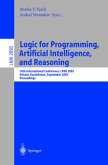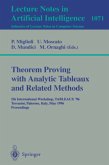John Lloyd / Veronica Dahl / Ulrich Furbach / Manfred Kerber / Kung-Kiu Lau / Catuscia Palamidessi / Luis M. Pereira / Yehoshua Sagiv / Peter J. Stuckey (eds.)First International Conference London, UK, July 24-28, 2000 Proceedings
Computational Logic - CL 2000
First International Conference London, UK, July 24-28, 2000 Proceedings
Herausgegeben:Lloyd, John; Dahl, Veronica; Furbach, Ulrich
John Lloyd / Veronica Dahl / Ulrich Furbach / Manfred Kerber / Kung-Kiu Lau / Catuscia Palamidessi / Luis M. Pereira / Yehoshua Sagiv / Peter J. Stuckey (eds.)First International Conference London, UK, July 24-28, 2000 Proceedings
Computational Logic - CL 2000
First International Conference London, UK, July 24-28, 2000 Proceedings
Herausgegeben:Lloyd, John; Dahl, Veronica; Furbach, Ulrich
- Broschiertes Buch
- Merkliste
- Auf die Merkliste
- Bewerten Bewerten
- Teilen
- Produkt teilen
- Produkterinnerung
- Produkterinnerung
These are the proceedings of the First International Conference on Compu- tional Logic (CL 2000) which was held at Imperial College in London from 24th to 28th July, 2000. The theme of the conference covered all aspects of the theory, implementation, and application of computational logic, where computational logic is to be understood broadly as the use of logic in computer science. The conference was collocated with the following events: { 6th International Conference on Rules and Objects in Databases (DOOD 2000) { 10th International Workshop on Logic-based Program Synthesis and Tra-…mehr
Andere Kunden interessierten sich auch für
![Automated Reasoning with Analytic Tableaux and Related Methods Automated Reasoning with Analytic Tableaux and Related Methods]() Nicola Olivetti (Volume ed.)Automated Reasoning with Analytic Tableaux and Related Methods38,99 €
Nicola Olivetti (Volume ed.)Automated Reasoning with Analytic Tableaux and Related Methods38,99 €![Logics in Artificial Intelligence Logics in Artificial Intelligence]() Michael Fisher / Wiebe van der Hoek / Boris Konev / Alexei LisitsaLogics in Artificial Intelligence39,99 €
Michael Fisher / Wiebe van der Hoek / Boris Konev / Alexei LisitsaLogics in Artificial Intelligence39,99 €![Automated Reasoning Automated Reasoning]() Ulrich Furbach (Volume ed.) / Natarajan ShankarAutomated Reasoning77,99 €
Ulrich Furbach (Volume ed.) / Natarajan ShankarAutomated Reasoning77,99 €![Logic for Programming, Artificial Intelligence, and Reasoning Logic for Programming, Artificial Intelligence, and Reasoning]() Robert Nieuwenhuis / Andrei Voronkov (eds.)Logic for Programming, Artificial Intelligence, and Reasoning78,99 €
Robert Nieuwenhuis / Andrei Voronkov (eds.)Logic for Programming, Artificial Intelligence, and Reasoning78,99 €![Logic Programming and Nonmonotonic Reasoning Logic Programming and Nonmonotonic Reasoning]() Chitta Baral / Gerhard Brewka / John Schlipf (eds.)Logic Programming and Nonmonotonic Reasoning38,99 €
Chitta Baral / Gerhard Brewka / John Schlipf (eds.)Logic Programming and Nonmonotonic Reasoning38,99 €![Logic for Programming, Artificial Intelligence, and Reasoning Logic for Programming, Artificial Intelligence, and Reasoning]() Moshe Vardi / Andrei Voronkov (eds.)Logic for Programming, Artificial Intelligence, and Reasoning39,99 €
Moshe Vardi / Andrei Voronkov (eds.)Logic for Programming, Artificial Intelligence, and Reasoning39,99 €![Theorem Proving with Analytic Tableaux and Related Methods Theorem Proving with Analytic Tableaux and Related Methods]() MiglioliTheorem Proving with Analytic Tableaux and Related Methods39,99 €
MiglioliTheorem Proving with Analytic Tableaux and Related Methods39,99 €-
-
-
These are the proceedings of the First International Conference on Compu- tional Logic (CL 2000) which was held at Imperial College in London from 24th to 28th July, 2000. The theme of the conference covered all aspects of the theory, implementation, and application of computational logic, where computational logic is to be understood broadly as the use of logic in computer science. The conference was collocated with the following events: { 6th International Conference on Rules and Objects in Databases (DOOD 2000) { 10th International Workshop on Logic-based Program Synthesis and Tra- formation (LOPSTR 2000) { 10th International Conference on Inductive Logic Programming (ILP 2000). CL 2000 consisted of seven streams: { Program Development (LOPSTR 2000) { Logic Programming: Theory and Extensions { Constraints { Automated Deduction: Putting Theory into Practice { Knowledge Representation and Non-monotonic Reasoning { Database Systems (DOOD 2000) { Logic Programming: Implementationsand Applications. The LOPSTR 2000 workshop constituted the program development stream and the DOOD 2000 conference constituted the database systems stream. Each stream had its own chair and program committee, which autonomously selected the papers in the area of the stream. Overall, 176 papers were submitted, of which 86 were selected to be presented at the conference and appear in these proceedings. The acceptance rate was uniform across the streams. In addition, LOPSTR 2000 accepted about 15 extended abstracts to be presented at the conference in the program development stream.
Hinweis: Dieser Artikel kann nur an eine deutsche Lieferadresse ausgeliefert werden.
Hinweis: Dieser Artikel kann nur an eine deutsche Lieferadresse ausgeliefert werden.
Produktdetails
- Produktdetails
- Lecture Notes in Computer Science 1861
- Verlag: Springer / Springer Berlin Heidelberg / Springer, Berlin
- Artikelnr. des Verlages: 978-3-540-67797-0
- 2000.
- Seitenzahl: 1428
- Erscheinungstermin: 17. Juli 2000
- Englisch
- Abmessung: 235mm x 155mm x 77mm
- Gewicht: 1710g
- ISBN-13: 9783540677970
- ISBN-10: 3540677976
- Artikelnr.: 23924384
- Herstellerkennzeichnung
- Springer-Verlag GmbH
- Tiergartenstr. 17
- 69121 Heidelberg
- ProductSafety@springernature.com
- Lecture Notes in Computer Science 1861
- Verlag: Springer / Springer Berlin Heidelberg / Springer, Berlin
- Artikelnr. des Verlages: 978-3-540-67797-0
- 2000.
- Seitenzahl: 1428
- Erscheinungstermin: 17. Juli 2000
- Englisch
- Abmessung: 235mm x 155mm x 77mm
- Gewicht: 1710g
- ISBN-13: 9783540677970
- ISBN-10: 3540677976
- Artikelnr.: 23924384
- Herstellerkennzeichnung
- Springer-Verlag GmbH
- Tiergartenstr. 17
- 69121 Heidelberg
- ProductSafety@springernature.com
Ulrich Furbach ist Professor für Künstliche Intelligenz an der Universität Koblenz-Landau. Seine Forschungsgebiete umfassen Automatisches Schließen, Agenten und Robotik sowie Frage-Antwort-Systeme. Er ist an der TU München habilitiert, an der Uni der Bundeswehr promoviert und ist Gründer und Gesellschafter des KI-Unternehmens wizAI.
John Lloyd, Guru der englischen TV-Comedy, wurde in einem Pub in Cambridge für die BBC angeworben. Er spielte in "Per Anhalter durch die Galaxis" und "Mr. Bean" und produziert unter anderem "Spitting Image" und die Kultquizshow "Quite Interessting", in der die Scheinbildung der Briten entlarvt wird.
John Lloyd, Guru der englischen TV-Comedy, wurde in einem Pub in Cambridge für die BBC angeworben. Er spielte in "Per Anhalter durch die Galaxis" und "Mr. Bean" und produziert unter anderem "Spitting Image" und die Kultquizshow "Quite Interessting", in der die Scheinbildung der Briten entlarvt wird.
Invited Papers.- Computational Logic: Memories of the Past and Challenges for the Future.- ILP: Just Do It.- Databases and Higher Types.- A Denotational Semantics for First-Order Logic.- Logic, Knowledge Representation, and Bayesian Decision Theory.- Program Development (LOPSTR).- Logic Program Synthesis in a Higher-Order Setting.- Coverability of Reset Petri Nets and Other Well-Structured Transition Systems by Partial Deduction.- Binary Speed Up for Logic Programs.- A New Module System for Prolog.- Logic Programming: Theory and Extensions.- Partial Models of Extended Generalized Logic Programs.- Alternating Fixpoint Theory for Logic Programs with Priority.- Proving Failure in Functional Logic Programs.- Semantics of Input-Consuming Logic Programs.- A Denotational Semantics of Defeasible Logic.- Isoinitial Semantics for Logic Programs.- Abstract Syntax for Variable Binders: An Overview.- Goal-Directed Proof Search in Multiple-Conclusioned Intuitionistic Logic.- Efficient EM Learning with Tabulation for Parameterized Logic Programs.- Model Generation Theorem Proving with Finite Interval Constraints.- Combining Mobile Processes and Declarative Programming.- Constraints.- Representing Trees with Constraints.- Dominance Constraints with Set Operators.- Better Communication for Tighter Cooperation.- Arc Consistency Algorithms via Iterations of Subsumed Functions.- AVAL: An Enumerative Method for SAT.- Constraint Logic Programming for Local and Symbolic Model-Checking.- A CLP Framework for Computing Structural Test Data.- Modelling Digital Circuits Problems with Set Constraints.- Promoting Constraints to First-Class Status.- Developing Finite Domain Constraints - A Data Model Approach.- Concurrent Constraint Programming with Process Mobility.- A System for Tabled Constraint Logic Programming.- Automated Deduction: Putting Theory into Practice.- Finding Tractable Formulas in NNF.- The Taming of the (X)OR.- On an ?-Decidable Deductive Procedure for Non-Horn Sequents of a Restricted FTL.- Representing Object Code.- Towards an Efficient Tableau Method for Boolean Circuit Satisfiability Checking.- Certification of Compiler Optimizations Using Kleene Algebra with Tests.- An Application of Model Building in a Resolution Decision Procedure for Guarded Formulas.- Model Checking for Timed Logic Processes.- Perfect Model Checking via Unfold/Fold Transformations.- Automatic Derivation and Application of Induction Schemes for Mutually Recursive Functions.- Proof Planning with Multiple Strategies.- The Theory of Total Unary RPO Is Decidable.- Knowledge Representation and Non-monotonic Reasoning.- On the Problem of Computing the Well-Founded Semantics.- Computing Equilibrium Models Using Signed Formulas.- Extending Classical Logic with Inductive Definitions.- A Simple Characterization of Extended Abduction.- A New Equational Foundation for the Fluent Calculus.- Solving the Entailment Problem in the Fluent Calculus Using Binary Decision Diagrams.- Decidability Resultsfor the Propositional Fluent Calculus.- A Meta-logical Semantics for Features and Fluents Based on Compositional Operators over Normal Logic Programs.- Default Reasoning with Specificity.- Planning under Incomplete Knowledge.- Wire Routing and Satisfiability Planning.- Including Diagnostic Information in Configuration Models.- Comparing the Expressive Powers of Some Syntactically Restricted Classes of Logic Programs.- On Complexity of Updates through Integrity Constraints.- Computational Complexity of Planning Based on Partial Information about the System's Present and Past States.- Smallest Equivalent Sets for Finite Propositional Formula Circumscription.- A Semantics for Persistency in Propositional Dynamic Logic.- Database Systems (DOOD).- Applications of Annotated Predicate Calculus to Querying Inconsistent Databases.- Querying Inconsistent Databases: Algorithms and Implementation.- On Verification in Logic Database Languages.- Mining Minimal Non-redundant Association Rules UsingFrequent Closed Itemsets.- Linearly Bounded Reformulations of Conjunctive Databases.- MuTACLP: A Language for Declarative GIS Analysis.- Reasoning about Duplicate Elimination with Description Logic.- A File System Based on Concept Analysis.- A Semantic Approach for Schema Evolution and Versioning in Object-Oriented Databases.- SLDMagic - The Real Magic (With Applications to Web Queries).- FLORA: Implementing an Efficient DOOD System Using a Tabling Logic Engine.- Design and Implementation of the Physical Layer in WebBases: The XRover Experience.- A Dynamic Approach to Termination Analysis for Active Database Rules.- Constraint-Based Termination Analysis for Cyclic Active Database Rules.- A Formal Model for an Expressive Fragment of XSLT.- On the Equivalence of XML Patterns.- Querying XML Specified WWW Sites: Links and Recursion in XML-GL.- A Heuristic Approach for Converting HTML Documents to XML Documents.- Specification of an Active Database System Application Using Dynamic RelationNets.- Invariance, Maintenance, and Other Declarative Objectives of Triggers - A Formal Characterization of Active Databases.- Logic Programming: Implementations and Applications.- Fluents: A Refactoring of Prolog for Uniform Reflection and Interoperation with External Objects.- So Many WAM Variations, So Little Time.- A Module Based Analysis for Memory Reuse in Mercury.- Mode Checking in HAL.- The Impact of Cache Coherence Protocols on Parallel Logic Programming Systems.- Data Protection by Logic Programming.- A Deterministic Shift-Reduce Parser Generator for a Logic Programming Language.- A Logic Programming Application for the Analysis of Spanish Verse.- A Documentation Generator for (C)LP Systems.- Psychiatric Diagnosis from the Viewpoint of Computational Logic.
Invited Papers.- Computational Logic: Memories of the Past and Challenges for the Future.- ILP: Just Do It.- Databases and Higher Types.- A Denotational Semantics for First-Order Logic.- Logic, Knowledge Representation, and Bayesian Decision Theory.- Program Development (LOPSTR).- Logic Program Synthesis in a Higher-Order Setting.- Coverability of Reset Petri Nets and Other Well-Structured Transition Systems by Partial Deduction.- Binary Speed Up for Logic Programs.- A New Module System for Prolog.- Logic Programming: Theory and Extensions.- Partial Models of Extended Generalized Logic Programs.- Alternating Fixpoint Theory for Logic Programs with Priority.- Proving Failure in Functional Logic Programs.- Semantics of Input-Consuming Logic Programs.- A Denotational Semantics of Defeasible Logic.- Isoinitial Semantics for Logic Programs.- Abstract Syntax for Variable Binders: An Overview.- Goal-Directed Proof Search in Multiple-Conclusioned Intuitionistic Logic.- Efficient EM Learning with Tabulation for Parameterized Logic Programs.- Model Generation Theorem Proving with Finite Interval Constraints.- Combining Mobile Processes and Declarative Programming.- Constraints.- Representing Trees with Constraints.- Dominance Constraints with Set Operators.- Better Communication for Tighter Cooperation.- Arc Consistency Algorithms via Iterations of Subsumed Functions.- AVAL: An Enumerative Method for SAT.- Constraint Logic Programming for Local and Symbolic Model-Checking.- A CLP Framework for Computing Structural Test Data.- Modelling Digital Circuits Problems with Set Constraints.- Promoting Constraints to First-Class Status.- Developing Finite Domain Constraints - A Data Model Approach.- Concurrent Constraint Programming with Process Mobility.- A System for Tabled Constraint Logic Programming.- Automated Deduction: Putting Theory into Practice.- Finding Tractable Formulas in NNF.- The Taming of the (X)OR.- On an ?-Decidable Deductive Procedure for Non-Horn Sequents of a Restricted FTL.- Representing Object Code.- Towards an Efficient Tableau Method for Boolean Circuit Satisfiability Checking.- Certification of Compiler Optimizations Using Kleene Algebra with Tests.- An Application of Model Building in a Resolution Decision Procedure for Guarded Formulas.- Model Checking for Timed Logic Processes.- Perfect Model Checking via Unfold/Fold Transformations.- Automatic Derivation and Application of Induction Schemes for Mutually Recursive Functions.- Proof Planning with Multiple Strategies.- The Theory of Total Unary RPO Is Decidable.- Knowledge Representation and Non-monotonic Reasoning.- On the Problem of Computing the Well-Founded Semantics.- Computing Equilibrium Models Using Signed Formulas.- Extending Classical Logic with Inductive Definitions.- A Simple Characterization of Extended Abduction.- A New Equational Foundation for the Fluent Calculus.- Solving the Entailment Problem in the Fluent Calculus Using Binary Decision Diagrams.- Decidability Resultsfor the Propositional Fluent Calculus.- A Meta-logical Semantics for Features and Fluents Based on Compositional Operators over Normal Logic Programs.- Default Reasoning with Specificity.- Planning under Incomplete Knowledge.- Wire Routing and Satisfiability Planning.- Including Diagnostic Information in Configuration Models.- Comparing the Expressive Powers of Some Syntactically Restricted Classes of Logic Programs.- On Complexity of Updates through Integrity Constraints.- Computational Complexity of Planning Based on Partial Information about the System's Present and Past States.- Smallest Equivalent Sets for Finite Propositional Formula Circumscription.- A Semantics for Persistency in Propositional Dynamic Logic.- Database Systems (DOOD).- Applications of Annotated Predicate Calculus to Querying Inconsistent Databases.- Querying Inconsistent Databases: Algorithms and Implementation.- On Verification in Logic Database Languages.- Mining Minimal Non-redundant Association Rules UsingFrequent Closed Itemsets.- Linearly Bounded Reformulations of Conjunctive Databases.- MuTACLP: A Language for Declarative GIS Analysis.- Reasoning about Duplicate Elimination with Description Logic.- A File System Based on Concept Analysis.- A Semantic Approach for Schema Evolution and Versioning in Object-Oriented Databases.- SLDMagic - The Real Magic (With Applications to Web Queries).- FLORA: Implementing an Efficient DOOD System Using a Tabling Logic Engine.- Design and Implementation of the Physical Layer in WebBases: The XRover Experience.- A Dynamic Approach to Termination Analysis for Active Database Rules.- Constraint-Based Termination Analysis for Cyclic Active Database Rules.- A Formal Model for an Expressive Fragment of XSLT.- On the Equivalence of XML Patterns.- Querying XML Specified WWW Sites: Links and Recursion in XML-GL.- A Heuristic Approach for Converting HTML Documents to XML Documents.- Specification of an Active Database System Application Using Dynamic RelationNets.- Invariance, Maintenance, and Other Declarative Objectives of Triggers - A Formal Characterization of Active Databases.- Logic Programming: Implementations and Applications.- Fluents: A Refactoring of Prolog for Uniform Reflection and Interoperation with External Objects.- So Many WAM Variations, So Little Time.- A Module Based Analysis for Memory Reuse in Mercury.- Mode Checking in HAL.- The Impact of Cache Coherence Protocols on Parallel Logic Programming Systems.- Data Protection by Logic Programming.- A Deterministic Shift-Reduce Parser Generator for a Logic Programming Language.- A Logic Programming Application for the Analysis of Spanish Verse.- A Documentation Generator for (C)LP Systems.- Psychiatric Diagnosis from the Viewpoint of Computational Logic.

